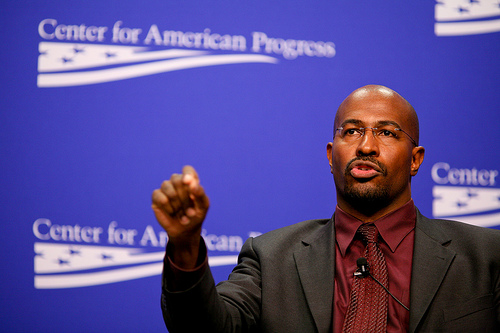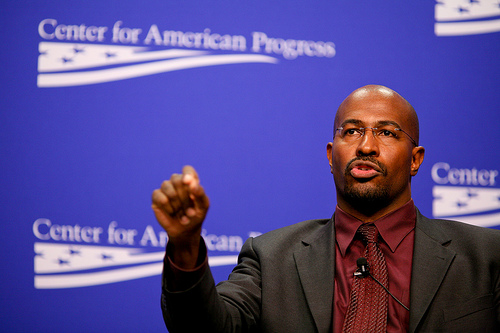 Van JonesA while back I lampooned a Glenn Beck segment on Van Jones, who’s an advisor to the White House Council on Environmental Quality. According to Beck, Jones is the man on the inside for a vast cryptosocialist conspiracy involving the Apollo Alliance, Color of Change, the Center for American Progress, George Soros, ACORN, Al Queda, and the Trilateral Commission. Everything that goes bump in Beck’s closet at night.
Van JonesA while back I lampooned a Glenn Beck segment on Van Jones, who’s an advisor to the White House Council on Environmental Quality. According to Beck, Jones is the man on the inside for a vast cryptosocialist conspiracy involving the Apollo Alliance, Color of Change, the Center for American Progress, George Soros, ACORN, Al Queda, and the Trilateral Commission. Everything that goes bump in Beck’s closet at night.
Back then I still thought the Gomer Pyle meets Father Coughlin shtick was harmless, too clownish to be taken seriously. Ah, those innocent days before the nation was locked in a room with frantic teabaggers.
Since then Beck’s fruitcakery has taken off all over the rightosphere and gotten him what every demagogic infomercial host craves above all else: attention. Advertisers have sprinted away by the dozens, but there are more than enough angry old white people to boost cable ratings.
I suspect his effort to slime Jones will have little effect, as long as the White House doesn’t get jumpy. Nobody who isn’t already around the bend buys this stuff. It’s a game Rupurt Murdoch’s playing. He knows it will implode sooner or later, but he’s going to suck every last Nielson point out of it.
Meanwhile, Beck is selling fear like hotcakes, effectively inciting people to violence, telling them their country is being taken from them by blacks and commies. Even black commies! The longer Beck goes on, the higher the chances that a Fox viewer with a screw loose will take him seriously and hurt someone. Think Murdoch’s ratings will take a hit if that happens? Me neither. It’s morally reprehensible, but what can you do? It’s a free country and people are free to be two-bit hucksters.
Anyway, just for the record, let’s address a few of the Not-Too-Swift Boat attacks. (Where you’re done here, you might also check out some similar fact-checking from Eva Paterson, Jones’ old boss.)
• Van Jones is not a “Green Jobs Czar.” There is no such thing. There has never been a job with that title. No one in the administration has ever used that term. Jones is special advisor for green jobs, enterprise and innovation at CEQ. “Green Jobs Czar” a title made up by the media. Beck’s obsession with the term — common parlance in politics since Nixon — is as inexplicable in substance as it is creepy in intensity. Regardless, Jones doesn’t have mysterious and unaccountable powers to shape the economy. In fact he’s a newbie, a low-level political appointee with two Senate-confirmed layers between him and Obama.
But of course, he’s black. And Beck’s audience just knew a black president would bring in more of his kind. You know how those people behave. There goes the neighborhood.
• Jones is not a “criminal” or an “ex-con” (speaking of barely sub-rosa racism). In 1992, while still attending Yale Law School, Jones volunteered as a legal monitor at a peaceful protest in the wake of the Rodney King verdict. It was in San Francisco, not L.A. He, some other legal monitors, and some protesters were briefly and illegally arrested. They were released in four hours, and later received a legal settlement over the violation of their rights. They were never charged with a crime, much less convicted. The same thing — improper arrest during peaceful protest — happened to Jones twice more; again, no charges were ever filed. That is the basis on which Sean Hannity called Jones an “ex-con” on national television. Stay classy, Sean.
• Jones is not a black nationalist or a communist. Beck’s entire fevered fantasia is spun out of a single article about Jones, based on an interview he did with a local paper in 2005 — long before he or anyone who knew him thought he’d ever work for the government. It’s actually a fascinating story on a human level. It recounts Jones’ evolution as a progressive from angry young radical protester to community organizer to activist bent on a strategy of unity and comity. It’s subtitled, “Van Jones renounced his rowdy black nationalism on the way toward becoming an influential leader of the new progressive politics.” If you’re interested in anything deeper than cable gimcrackery, I recommend giving it a read.
If you know Jones, you know he’s extremely candid; you also know the guy absolutely loves talking, loves the richness and drama of language, loves a funny or dramatic turn of phrase. (Would that more progressive leaders loved language the same way.) So things like this, when he talks about his anger at police overreaction —
Convinced that American society needed a wake-up call on race, Jones abandoned his plan to become a journalist, concluding that he would rather make news than report it. “If I’d been in another country, I probably would have joined some underground guerrilla sect,” he said. “But as it was, I went on to an Ivy League law school.”
— are just funny to me. But they’re easy to demagogue. Of course it’s true that Jones was a self-styled radical in his youth. Hell, I was once a “self-avowed” libertarian. People grow up.
Around 2000, faced with a fractured and infighting movement, he had something of a breakdown/epiphany. He turned his back on radicalism and focused on finding a political program that inspires and unifies. If there are two signal features of Jones’ subsequent activism, one is that it builds bridges among demographics that have historically approached one another with suspicion; the other is that it relies crucially on both the private and public sectors. It reclaims what conservatives have stolen and perverted: respect for free markets, patriotism, and family values. Indeed, when Jones talks about targeting jobs and economic development at struggling urban areas, he sounds like nobody so much as the late Jack Kemp. I once saw him deliver a short talk to a crowd of largely white, middle-aged, besuited businessmen at a Wall Street Journal business conference; he was sandwiched in the middle a long line of droning talks. Within 10 minutes, he had the executives on their feet in a standing ovation. They don’t do that for communism.
If you want to know what Jones thinks now, instead of what he thought in his early 20s, read his book: The Green Collar Economy: How One Solution Can Fix Our Two Biggest Problems. He’s out to save America’s free-market economy and get its people working. If the conservative movement were smart it would take yes for an answer and claim him as one if its own. But then, it’s not smart. It’s Beck.
If it’s not going to claim him, the right is correct to fear him, though. He has synthesized the best of environmentalism, progressivism, and capitalism into a program with appeal both broad and intense. It’s particularly notable among young people, but Jones gets acclaim from virtually everyone who’s met him or seen him speak. The more his kind of can-do, entrepreneurial, win-win green solutions spread, the more modern-day conservatives look like panicked, lumbering dinosaurs.
Sooner or later the American public will see something like this:
They’ll see that Jones bears no resemblance to the caricature painted by the right. That caricature is just another shadow on the wall of Plato’s cave (or Fox’s studio, as the case may be). It’s another campfire story, another cloud for righties to shout at, another adrenalin boost for a frightened, angry, shrinking audience. This too shall pass.




